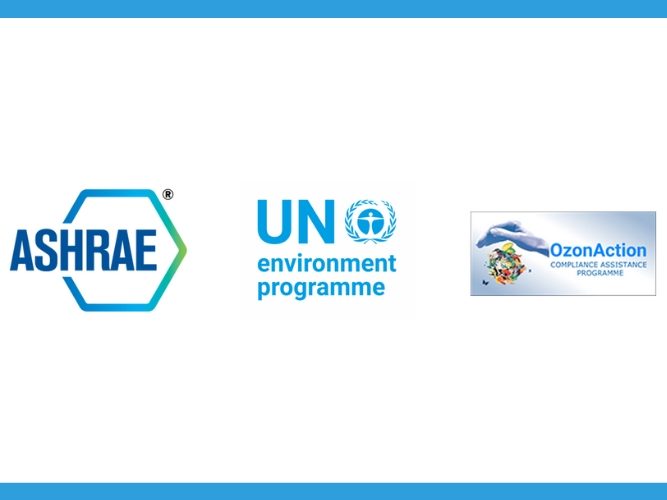ASHRAE, UNEP Announce Lower GWP Award Selections

ASHRAE and UN Environment Programme (UNEP) have announced the project selections for the 2023 ASHRAE-UNEP OzonAction Lower-GWP Refrigeration and Air-Conditioning Innovation Awards.
The annual international award program promotes innovative design, research and practice by recognizing people who have developed or implemented innovative technological concepts applied in developing countries to promote lower global warming potential (GWP) refrigerants through refrigeration and air-conditioning applications.
"The projects selected represent long-term, global and energy-efficient solutions to lessen the impact of ozone-depleting substances," said 2023-24 ASHRAE President and co-chair of the judging committee Ginger Scoggins, P.E., Fellow ASHRAE. "We congratulate the selected project teams and look forward to witnessing their innovative concepts set a benchmark for sustainability in developing countries."
The projects in each category were selected based on delivering innovative solutions to meet refrigeration and air-conditioning needs by using lower-GWP technologies. The selection criteria included the following:
- Extent of need.
- Innovative aspects in transforming conventional practices.
- Technical replicability to developing countries.
Judges also accounted for economic feasibility when possible, considering that growing acceptance of new technologies will favorably influence cost and availability.
"We are living at a watershed moment under the Montreal Protocol when developing countries must find long-term solutions to replace HCFC refrigerants while simultaneously minimizing climate impacts," said James S. Curlin, Head of UNEP OzonAction and co-chair of the judging committee. "It is vital to empower the research community to identify new approaches and alternative refrigerants that work for those countries. UNEP OzonAction is proud to join with ASHRAE to recognize these winners who are proposing approaches that address the ozone, climate and energy dimensions."
The following four projects were selected, all in the Commercial/Industrial Applications category:
- HC-290 (Propane) as an Alternative Refrigerant in Commercial Applications (Ecuador)
Project Team: Rodrigo Serpa, Fernando Del Castillo, Omarly Acevedo, and Ana Correa
This cold store project used HC-290 as an alternative refrigerant in commercial applications. The project resulted in a 36% reduction in energy consumption and a 41% decrease in total equivalent CO2 emissions. It also provided inputs for updating regulations on flammable refrigerants. A part of the project was to perform a flammability risk assessment following the refrigeration safety standard (EN-378) and the explosive atmospheres standard (EN-1127-1) to identify possible sources of ignition and then to implement actions to eliminate them including HC-290 sensors inside the room.
- Flammable Refrigerant Use in a Draft Beer Machine (Brazil)
Project Team: Eduardo Arjona Esteves, Lucas Cavalin, David Marcussi, Davi Telles, and Roberto Cavalin
This project developed a new heat exchanger composition for draft beer machines, allowing the use of flammable refrigerants and improving cooling efficiency. The new design reduces the refrigerant charge, eliminates oil accumulation issues, and enhances heat exchange between fluids and the intermediate material. The project demonstrated the environmental benefits by achieving lower energy consumption and CO2 emissions, while maintaining the size and usability of the equipment.
- Ammonia Use in Multipurpose Cold Storage (India)
Project Team: Harshal Surange and Arvind Surange
The project is a multipurpose cold storage utilizing a low-charge DX ammonia system with air-cooled condensers and electronic expansion valves, a first of its kind in India. By using ammonia as a refrigerant, which has a low Global Warming Potential (GWP) and zero Ozone Depletion Potential (ODP), the project has a positive environmental impact while reducing water consumption and energy consumption through the use of adiabatic pre-cooling systems. The following three main features are innovative:
- An air-cooled condenser is considered with adiabatic cooling that starts when the ambient temperature exceeds 32 C. This avoids high condensing pressures for ammonia.
- Ability to convert storage chambers based on market demand to low or positive temperatures without increasing energy cost.
- A dry cooler with adiabatic pre-cooling of condenser inlet air is used for this compressor jacket cooling avoiding excessive use of water and keeping the compressor jacket corrosion free.
- Propane Chiller Use in a Convenience Store (Brazil)
Project Team: Fernando Sayols Marchioro, Éder Paluch, and Elielton Polityto
The project involves the development of a modular low-charge refrigerant chiller using propane.
as an HCFC replacement in commercial facilities in Brazil. The innovation includes the following:
- A centralized control system.
- Capacity control by mass flow variation.
- The use of low internal volume evaporators and condensers to minimize refrigerant charge.
The modular system allows for easy replacement of faulty equipment and eliminates the need for maintenance in the field. The benefits of this project include optimized performance, reduced environmental impact through natural refrigerants, and potential future retrofit opportunities in developing countries. The adoption of the concept of a control and pumping unit separate from the cooling modules enhanced safety, since all the electrical power and control parts were separated from the propane circulation environment, thus avoiding possible generation problems.
The judges who reviewed the entries were Nesreen Ghaddar (Lebanon), Cesar Lim (Philippines), Roberto Peixoto (Brazil) and James Wolf (United States).
The selected projects were announced at the 2023 ASHRAE Annual Conference in Tampa, Fla. Selected project teams will be recognized with the awarding of certificates at UNEP events held in the regions or countries of the projects.
For more details on the awarded projects and other ASHRAE-UNEP OzonAction activities, visit ashrae.org/ashrae-unep-portal.




